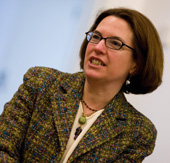The Elements of Good Leadership
There is no magic formula for successful leadership, says Deborah Ancona, director of the MIT Leadership Center at the MIT Sloan School of Management. Instead, each leader needs to figure out his or her own unique leadership signature — one that draws on his or her own strengths.
Martha E. Mangelsdorf
Reading Time: 2 min

Deborah Ancona, director of the MIT Leadership Center at the MIT Sloan School of Management.
Image courtesy of MIT Sloan.
What does it take to be an effective leader in today’s unpredictable and uncertain business environments?
Earlier this month, I attended an MIT Sloan executive education course called “Transforming Your Leadership Strategy,” taught by MIT Sloan professor Deborah Ancona. While a good deal of the learning in the course took place through interactive exercises, Ancona conveyed many important points about effective leadership through her presentations. Here are a few of those points:
- Leadership is personal. There is no magic formula for successful leadership, Ancona explained — and no one-size-fits-all best practices, either. Instead, each leader needs to answer the question: “What is the best way for me to lead?” Each person needs to figure out his or her own unique leadership signature — one that draws on his or her own strengths. While charismatic leaders are particularly memorable, there are many other ways to be an effective leader, Ancona pointed out.
- That said, leadership involves four overarching capabilities. Ancona teaches a leadership framework developed at MIT that involves four key capabilities: sensemaking (in other words, making sense of the business environment in which your company operates); visioning; relating to others; and inventing new ways to get things done. In a 2007 Harvard Business Review article called “In Praise of the Incomplete Leader,” Ancona and colleagues Thomas Malone, Wanda Orlikowski and Peter Senge wrote that leaders often excel in one or two of the four capabilities — but no leader is equally strong in all four areas. As a result, leaders should search for others who can complement them.
- Today’s leaders need the ability to make sense of complex environments. Sensemaking — the ability to make sense of what’s going on in a changing and complex environment — is a particularly important predictor of leadership effectiveness right now, Ancona explained. Sensemaking in business (a term drawn from the works of

Comments (3)
Worth Reading on 3/28/2014 | ArtRainer.com
dave
Deborah Ancona talks to Sloan Management Review about Leadership « MIT Sloan Experts